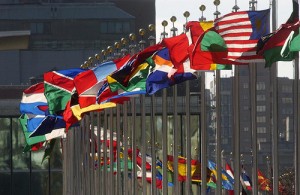The Rio+20 Agenda: The Future Only Some Want
Apr 4th, 2012 | By admin | Category: Rio+20 Earth SummitBy Suzanne York, HowMany.org, April 3, 2012
Recent negotiations in New York City to prepare a document and agenda for the upcoming Rio+20 conference ended on a discouraging note. Civil society organizations sent an open letter to the secretary general for the United Nations Conference on Sustainable Development (UNCSD), citing frustration with the process and calling for a rights-based process.
This letter was in response to “attempts by certain countries to weaken or even eliminate references to human rights and equity principles in the draft Rio text”, The Future We Want (also referred to as the zero draft negotiating text, to be finalized in Rio). Member nations to the UNCSD had met in “informal-informal” sessions for nearly a week.
With a conference emphasis on the green economy (which has various definitions), there is great worry that money will trump human rights. The civil society open letter noted a “strong push for private sector investments and initiatives to fill in the gap left by the public sector” which could lead to increased privatization of public services and shared natural resources such as water.
Civil society members and even some government ministers believe that weakening – or worse, removing – the human rights safeguards in the text would leave out vulnerable groups and marginalized sectors from the so-called green economy.
The Chief Negotiator of Bolivia to the UN said “private access and control and property over natural resources is being prioritized in the discussions.”
A representative of the Business and Industry Major Group talked about the green economy as a means to link “economic growth with environmental sustainability,” and that the group is pushing for an agreed-upon definition of “green economy” in the text.
Doris Mpoumou, from the International Planned Parenthood Federation/Western Hemisphere Region delivered perhaps the best message to the negotiators on behalf of the Women’s Major Group. She told them that women “are outraged at any efforts that aim to delete hard won references to rights and equity in the text, including agreed human rights language. Governments should not waste time bracketing our rights! INSTEAD, they should spend time IMPLEMENTING them!”
There has been great disappointment with the original draft text, and the despair is growing that nothing much will come of the final Rio text in June. Derek Osborn, President of the Stakeholder Forum, recently wrote about what he took away from the discussions, which was “We hear and see timidity, caution, suspicion, protection of vested interests, and even attempts to undermine and go backward on rights, actions and issues already agreed.”
Most would agree that we cannot afford today to simply make grandiose statements, much worse take even one step backward. Much is at stake in Rio, but heads of state and policymakers don’t seem to be taking it seriously, or even if they are, expectations for the summit are very low. It seems that the UN, which was founded on the principle of global human rights, might be putting business before people and the environment.
Let’s hope the UN takes the high road and listens to Doris Mpoumou and others and commits to putting human rights and gender equality – ideas that have been long fought for by many – front and center.
Suzanne York is a senior writer with the Institute for Population Studies/HowMany.org.

